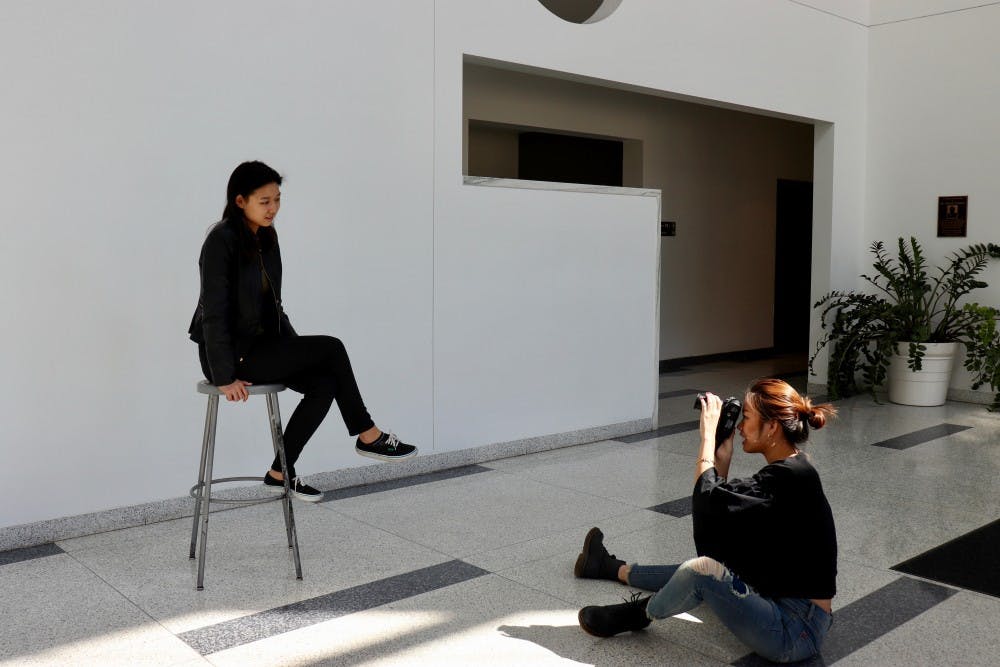
A host of Penn students, particularly those studying computer science, are posting photos to social media about Penn's diversity statistics in the field.
The Penn Women in Computer Science student organization is sponsoring a social media movement called "The % Project," aimed at increasing awareness for diversity issues in Penn's computer science field.
This initiative involves students posting pictures on social media displaying statistics from a recent diversity census conducted by WiCS in coordination with the Computer and Information Science Department last month, which approximately 300 students enrolled in computer science at Penn replied to. The survey asked questions about demographics, feminism, student culture, harassment, and engagement in both class and online homework forums.
Engineering sophomore Lucia Huo said that after looking at the data from the diversity census, she figured, “Why not just make this an art project?” to draw more attention to the important data.
Engineering junior Stephanie Tang, who serves as advocacy chair on the WiCS board, organized "The % Project," along with fellow members Huo and Engineering sophomore Alice Deng. Tang emphasized that the project is about “putting a face to these statistics."
The diversity census presented significant disparities in representation of minority and female students and teaching assistants in computer science. Beyond that, responses also demonstrated uncertainty toward feminism, with 50 percent of students saying they would not consider themselves as feminists.
The survey shed light on the experience of being a minority in the classroom. A question on the survey asking students to agree or disagree with the statement, "I generally feel comfortable asking questions during lecture," showed a disparity between students of different races and genders. While over 40 percent of Asian and white students agreed, only 17.65 percent of "black or African American" students agreed. Meanwhile, 23.76 percent of female students said they felt comfortable asking questions in class compared to over 60 percent of male students.
The survey also showed a “confidence gap” in Piazza, an online classroom forum for students to raise and answer questions to their professors, TAs, and classmates. The data showed a significant disparity between how willing female and minority students are to post un-anonymously to a homework site like Piazza.
Another question asked if students would be likely to report incidents of harassment and "micro-aggressions." Of respondents, 53 percent answered they would likely use a form to report such incidents anonymously.
Engineering and Wharton junior and WiCS President Andrea Ning said "The % Project" was necessary to shed light on the rather unapparent diversity issues in Penn's Computer and Information Science Department.
“Awareness is huge,” she said. “I think at Penn people assume there is not as much discrimination, especially not gender-based.”

The most recent numbers indicate that, of the total 800 Engineering students majoring in computer science at Penn, only 46 percent, which is less than 6 percent of Penn's undergraduate body, self-identified as an underrepresented minority. Comparatively, according to Penn's diversity statistics, 7 percent of Penn undergraduates are black, and slightly over 10 percent are Hispanic.
WiCS circulated a Google Form for volunteers to sign up to have their photos taken. The organization encouraged volunteers to choose a statistic to represent and change their profile picture on April 19. On that date, WiCS also posted a collage of the participants on Facebook.
The results of the survey were presented on March 30 at the first annual CIS Diversity Summit. Ning said that the CIS Diversity Summit committee is creating a roadmap of actionable steps to present to faculty based on the census results, ideas, and stories shared at the summit. A follow-up on the action items will begin in the fall.
WiCS Vice President of Marketing and College and Engineering sophomore Sneha Advani said social media campaigns like "The % Project" are important to not only raise awareness, but also to encourage females studying computer science to achieve tremendous success. “While women in computer science may be underrepresented,” she said, “they are not alone.”
The Daily Pennsylvanian is an independent, student-run newspaper. Please consider making a donation to support the coverage that shapes the University. Your generosity ensures a future of strong journalism at Penn.
Donate







